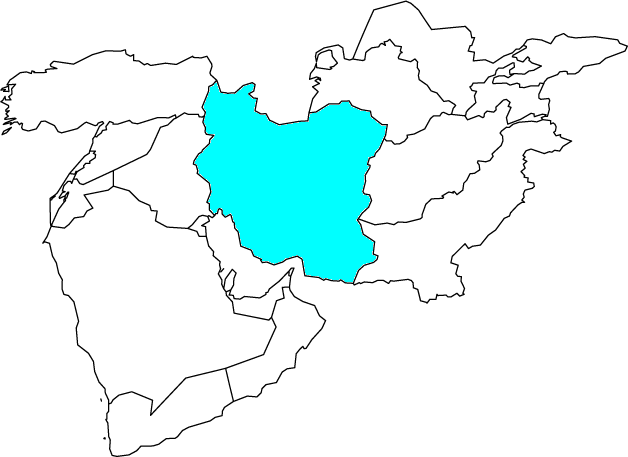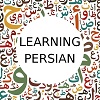Safety, dress code and other Iranian rules
Before you start reading, please note that the article only sums up my personal experience of 3 weeks in Iran in the spring of 2018. In many cases it's different from the official information and recommendation, which I don't want to dispute. I only want to share the common practice that I observed.
- Dress code
- The Internet is full of information that men are obligated to wear long pants and long sleeves, preferably a shirt. Thus on my inbound flight to Iran I looked like I'm going to a business meeting rather than a backpacking trip, but my backpack was full of ordinary T-shirts and fortunately I was able to wear them. At least half of the Iranian men were wearing short sleeves. Sandals were also quite common. Short trousers, however, were super rare and I only saw them a couple of times on the Persian Gulf coast and on the islands. And still even the shortest were way below knees.
- The dress code for women, however, is much less benevolent. Long sleeves and trousers are an udisputable must. Moreover, the shape of the buttocks shouldn't be recognizable. Most of the women solve this with a tunic or similar loose top that reaches at least halfway the thighs. The shoes can be open. Another clothing rule is the obligatory headscarf. Oficially, it should cover all the hair but in reality there are vast differences between specific regions. The women of Tehran in general don't take this very seriously and many of them have the hijab just loosely hung on the hair bun. I even saw girls that only had the scarf hanging on their neck in the north of Tehran (Darband, Chitgar). On the other hand, this was in no way the case of Yazd or Sirjan - a chador was the most common type of clothing in these areas. A loose hijab didn't cause any problems to my female friend in any region, but certainly was attracting attention in the mentioned cities.
- In any case, Iranians dress rather formally. Most of the men wear dark jeans and many of them also a shirt, though short sleeved. Jeans are also quite typical for women (I mean those not wearing chador). Both men and women mostly wear clothes with no patterns (except of hijabs) and no glaring colours. I would say that in general Iranians always try to look representatively, though this is not ordered by law of course.
- Contact between men and women
- I was very surprised how relaxed the practice in this matter is. I spent half of my Iranian trip with a female friend and basically the whole Internet claimed that this would be a problem. So we were ready for being forced to sleep in separate rooms or for not being allowed to sit next to each other on the public transport. This turned out to be a total bullshit.
- Hotels and other accommodations not only didn't have any problem letting us stay in the same room but in many cases also offered (or insisted on giving us) a double bed. The staff that didn't offer it usually thought we are siblings, which we rather didn't dispute. However, the Iranians we met claimed that this is only a privilege for foreigners.
- Regarding the public transport, we had no problems sitting next to each other on long distance buses. Supposedly, it's not appropriate for a man to sit next to a female stranger, but we didn't notice this rule to be followed anxiously. The public transport in the cities, however, sometimes features separate segments. Most of the buses in Tehran are cut in half, with the front being designated for women and the back for men. The metro in Tehran always has one carriage designated for women, the rest of the train is mixed. This segregation is followed by 99,9 % of the people. There are exceptions (mostly women) who rebel against, allegedly as kind of a protest gesture, so I would say that it's better not to try this in the position of a tourist.
- A physical contact in public between a man and a woman is not usual but again, it doesn't mean that it doesn't exist. As with other things, Tehran is more progressive in this matter - I saw quite a lot of couples holding hands there. This was very rare in the other cities and I haven't seen anything more intimate, not even in Tehran.
- The Internet
- First off, I want to deny the information that Iranian Internet is slow and difficult to access. The mobile internet is almost for free (2 GB for 2 €) and 4G is offered in the bigger cities. I even had a decent speed in smaller towns and I only was with no coverage at all in the vast deserts far away from any civilisation.
- The public wi-fi, however, is a catastrophy. Usually the speed is very low and the connection is not stable. Thankfully, this was not a big problem thanks to the price of the mobile Internet.
- An important aspect of the Iranian Internet are the blocked websites, which include Facebook, Twitter and Couchsurfing (Instagram works). These are not very suprising. But I was quite staggered by some of the other blocked websites, like BBC or Hostelworld. Even the Czech news portals are not accessible from Iran. Fortunately, this can be quickly solved by a couple of clicks on Google Play - any VPN client will do the job. Many Iranians will gladly help with choosing the best one, as from my experience I guess that there's no Iranian (at least in the younger generation) that wouldn't use it. After all, the most common sound that you can hear on the Tehran metro is the Facebook Messenger notification.
- Music
- Quite often I read the information that it's forbidden to play music in public, even in cars. Again, my experience is completely opposite. I saw young guys in cars with the windows down listening to the loudest dance music more often than home in Prague. Sometimes there's even music in the streets, with CD vendors advertising their goods with loud speakers.
- The most common genre I could hear was the current dance music. Something like this. Which is quite a paradox, as it's forbidden to dance in Iran, and this ban is followed strictly. I even saw a place in Tehran, that looked like a European night club. Dance music, light effects, but the people inside were just sitting or standing, drinking coffee and talking. I couldn't even come in, as I was already shaking in the rythm outside.
- Alcohol
- Alcohol is strictly forbidden in Iran and it's not possible to get your hands on it in any legal way. Despite that, the question Would you like some wine? was probably more frequent than home. What I want to say...outside of mosque, every Iranian knows an Iranian. And if he doesn't know the Iranian directly, he knows an Iranian that knows the Iranian.
- In the end I decided not to gain my own experience with Iranian drinking. I didn't really see a point in it and moreover, this trip was quite a unique opportunity to abstain for 3 weeks. On the other hand I totally understand, that it makes a significant point for Iranians - a simple civil disobedience.
- Etiquette
- Just a few most important etiquette rules, that are not enforced legally, but it's good to follow them if you don't want to look like a hick.
- Iranians don't blow their nose. Or well, they do, but not in public. The polite thing is to sniffle, the more polite thing is to excuse yourself and go blow your nose somewhere in private.
- Iranians take their shoes off. Quite anxiously. It's unthinkable to step into an Iranian household in your shoes, even if it's just one step.
- Men shake their hands when they meet, women too, but the situation between men and women is more complicated. Officially, I shouldn't even touch a female stranger. Despite that I experienced a handshake most of the times, and there were even some cheek kisses. It's hard to guess the correct way with each and every woman, so I usually just waited and adapted to what the particular woman did.
- Iranians are very thoughtful when it comes to cigarettes. Smoking is permitted practically everywhere and a majority of the nation are smokers, but only a very small minority will smoke in public. For example in coffee shops, I witnessed Iranians asking people at the tables around them, whether will they mind them smoking.
- Safety and the police
- I've never felt so safe and comfortable anywhere in the world, as I did in Iran. Unlike in Europe, where most of the smiling communicative strangers in the city centers just try to get tourists' money, the smiling and communicative Iranians mostly just want to talk. Or to take a selfie and offer a gift. In short - after a week in Iran I had no trouble to get in a stranger's car or to show a street vendor which banknotes I've got in my wallet. I was totally sure, that nothing will happen to me and I threw away my thorough cautiousness, that I gradually developed during my previous journeys.
- The police presence in the street is quite intense, but still less than in, let's say, France.
- Before my trip I also read a lot about the Iranian police's suspiciousness and that a badly timed picture can get you charged with espionage or at least an intense interrogation. But my experience is different even in this matter. In some cases I was knowingly pushing it and still nothing happened. One example for all - I was hanging around a governmental building for half hour, waiting for a friend. I had a camera in my hand and as I was bored, I was taking pictures of my surroundings. The policemen passing by only asked me a couple of How are you, Sir? type of questions. Basically any contact with the police was very friendly, a few policemen now follow me on Instagram and one of them invited me for coffee at a police station.
For more official information I recommend the British Foreign travel advice.



